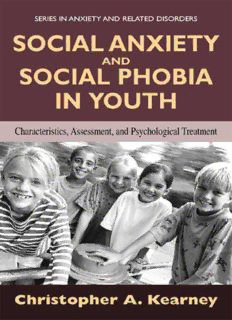
Social Anxiety and Social Phobia in Youth - Characteristics, Assessment, and Psychological Treatment PDF
Preview Social Anxiety and Social Phobia in Youth - Characteristics, Assessment, and Psychological Treatment
Social Anxiety and Social Phobia in Youth Characteristics, Assessment, and Psychological Treatment SERIES IN ANXIETY AND RELATED DISORDERS Series Editor: Martin M. Antony, Anxiety Treatment and Research Centre, St.Joseph’sHospital,Hamilton,Ontario,Canada SOCIALANXIETYANDSOCIALPHOBIAINYOUTH Characteristics,Assessment,andPsychologicalTreatment ChristopherA.Kearney AContinuationOrderPlanisavailableforthisseries.Acontinuationorderwillbringdeliveryofeachnewvolume immediatelyuponpublication.Volumesarebilledonlyuponactualshipment.Forfurtherinformationpleasecontact thepublisher. Social Anxiety and Social Phobia in Youth Characteristics, Assessment, and Psychological Treatment Christopher A. Kearney UniversityofNevada LasVeges,Nevada Springer eBookISBN: 0-387-22592-7 Print ISBN: 0-387-22591-9 ©2005 Springer Science + Business Media, Inc. Print ©2005 Springer Science + Business Media, Inc. Dordrecht All rights reserved No part of this eBook maybe reproducedor transmitted inanyform or byanymeans,electronic, mechanical, recording, or otherwise, without written consent from the Publisher Created in the United States of America Visit Springer's eBookstore at: http://ebooks.springerlink.com and the Springer Global Website Online at: http://www.springeronline.com ForDerekandClaire— Mayyourlivesbesocialones(butalittlecarefultoo). This page intentionally left blank PREFACE A great benefit of being a clinical child psychologist is the opportunity to conduct and review research on fascinating areas of human, youthful behavior.Andperhapsnobehaviorisascentraltohumanexistenceassocial behavior,andthelackthereof.Inwritingthisbook,therefore,Ihavebeen doubly blessed with the chance to examine seminal works on behaviors thataresocriticaltothedevelopmentandqualityoflifeofchildren. This book covers the major historical aspects, characteristics, assess- ment strategies, and psychological treatment techniques for youths with socialanxietyandsocialphobia.Chapter1providesanintroductiontothe relatedconstructsandhistoryofsocialphobia.Chapters2and3providea summaryofthecharacteristicsandetiologicalvariablesthatpertainmost toyouthswithsocialanxietyandsocialphobia.Chapters4and5provide an overview of research- and clinically-based assessment strategies and recommendationsforthispopulation.Chapters6–9provideadescription oftreatmenttechniquesthataremostrelevantandempiricallysupported foryouthswithsocialanxietyandsocialphobia.Chapter10coversissues regarding general and relapse prevention as well as difficult cases and futuredirections. Thisbookisintendedforawidearrayofaudiences,includingclinical and counseling psychologists, school and educational psychologists, so- cialworkers,psychiatrists,pediatricians,guidancecounselors,principals, teachers,andotherrelevantprofessionals.Ingeneral,though,thebookis meant for those who simply wish to gain a better knowledge of youths withsocialanxietyandsocialphobia.Theliteratureinthisareaisgrowing fast, and keeping up with the technologies that have been developed to measureandaddressthisimportantpopulationiscrucial. vii viii PREFACE This book is also a testament to the research pioneers in the area of childhood social anxiety and phobia, including Deborah Beidel, Annette LaGreca,AnneMarieAlbano,JeromeKagan,CynthiaLast,PhilipKendall, andWendySilverman,amongmanyothers.Thebookisalsotestamentto those adult social anxiety and phobia researchers who have contributed so much to the foundation of childhood assessment and treatment tech- nologiesinthisarea,includingRichardHeimberg,SamuelTurner,Philip Zimbardo,DavidBarlow,andMurrayStein,amongmanyothers. I would like to thank Marty Antony, the series editor, and the good people of Kluwer/Academic Plenum for the opportunity to publish this book.IspecificallythankMs.SharonPanullaatKluwer/AcademicPlenum for her invaluable assistance. In addition, I must give an enormous thank youtoAmieLemos,mytirelessgraduatestudentwhospentmonthsand monthstrackingdownformehundredsofarticlesandbooks.Ithankmy othergraduatestudentsaswellfortheirpatience,includingKellyDrake, Lisa Linning, Jennifer Vecchio, and Krisann Alvarez. As always, I thank CharlesRasmussenoftheUniversityofNevada,LasVegasforhissupport andsuccessfuleffortstosecureacomfortableworkenvironment.Finally, I thank my wife, Kimberlie, and our two children, Derek and Claire, for theirwonderfulemotionalsupportandpatienceaswell.Theycontinueto bemybestfriendsandteachers. CONTENTS 1. DefinitionandHistoryofSocialPhobiaandRelated ConceptsinYouth . . . . . . . . . . . . . . . . . . . . . . . . . . . . 1 2. MajorCharacteristicsofYouthswithSocialAnxiety andSocialPhobia . . . . . . . . . . . . . . . . . . . . . . . . . . . . 23 3. TheEtiologyofSocialAnxietyandSocialPhobia inYouths . . . . . . . . . . . . . . . . . . . . . . . . . . . . . . . . . . 49 4. Research-BasedAssessmentofSocialAnxietyand SocialPhobiainYouths . . . . . . . . . . . . . . . . . . . . . . . 71 5. ClinicalAssessmentofSocialAnxietyandSocial PhobiainYouths . . . . . . . . . . . . . . . . . . . . . . . . . . . . 93 6. TheTreatmentofSocialAnxietyandSocialPhobia inYouths . . . . . . . . . . . . . . . . . . . . . . . . . . . . . . . . . . 109 7. TreatingYouthswithSocialAnxietyandSocialPhobia: LayingtheGroundwork . . . . . . . . . . . . . . . . . . . . . . . 125 8. TreatingYouthswithSocialAnxietyandSocialPhobia: DevelopingAdvancedSkills . . . . . . . . . . . . . . . . . . . . 139 ix
Description: